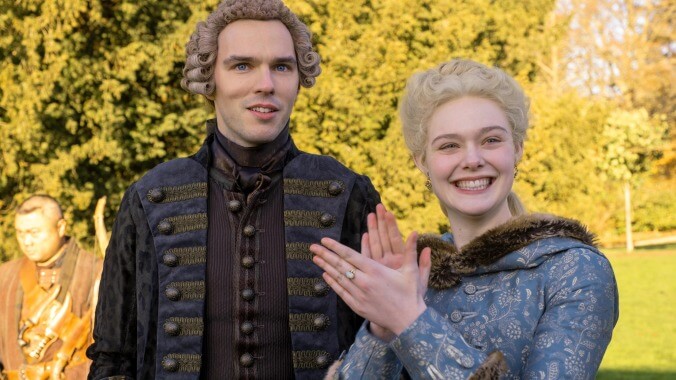Hulu’s The Great is a gorgeously delirious mashup of history


The latest in a line of highly irreverent period pieces, Hulu’s The Great takes inspiration from its Russian empress namesake and, more generally, the lives of brilliant women bound to exceedingly mediocre men. The caustically funny miniseries is a decidedly ahistorical romp; while The Great does construct traditional power structures and settings, creator Tony McNamara’s (co-writer of The Favourite) attitude toward a faithful recreation of late 18th-century Russia is neatly summarized by a 19-year-old Catherine (Elle Fanning) waving a bloody middle finger. Underneath its abundance of wit is a story of ambition, and where we allow it to be nurtured.
McNamara and his co-executive producer Marian Macgowan take many liberties to maintain a cogent narrative, even pruning a generation from the Russian monarch family tree. Throughout the series, Peter II (in reality, Peter III, who abdicated in 1762 after a six-month reign) waxes semi-eloquent about his father Peter The Great, while always suffering in comparison. His misguided attempts to continue his father’s work of modernization include banning beards for being physical representations of the old Russia. Played by a gleefully disinhibited Nicholas Hoult, Peter is malicious, mercurial; capable of real depth while being completely out of his depth. He has considerable power, but no vision.
Enter Catherine, a young German (actually Prussian) princess who’s dreaming of collaboration, not coups, when we first meet her. The premiere episode, also titled “The Great,” races through her courtship with Peter and their nuptials, skipping over a honeymoon period and leaving Catherine adrift in a foreign land. The real Catherine began to win over her new countrymen from the moment she arrived in Russia; the series’ Catherine, though just as well-educated, is much greener to start, struggling to navigate a loveless marriage and a group of indifferent nobles. After studying the works of various Enlightenment scholars and philosophers, Catherine is brimming with ideas for how to make Russia a beacon in the east, promoting a free press and greater agency for women. Yet, despite her royal marriage, she has no standing to effect change.
Just as in real life, The Great sets Catherine’s brilliance on a collision course with her husband’s incompetence. We know how things ended—with Peter’s abdication, then assassination—but the series finds trenchant comedy and even poignance in delaying the inevitable. As Catherine assembles her coup crew, she uncovers the extent of discontent in the land, and uses it to her advantage. Because every team looking to overthrow a government needs a policy wonk, she convinces Count Orlo (Sacha Dhawan), one of Peter’s advisors, to join her. Marial (Phoebe Fox), a disgraced noblewoman turned maid, is the perfect ally: She eggs Catherine on while putting things in perspective. When the young empress despairs that she is “a prisoner here… married to an idiot,” Marial can’t quip fast enough: “This has never happened to a woman before.”
Catherine also finds a companion and role model in Peter’s aunt Elizabeth (Belinda Bromilow, McNamara’s real-life spouse). Elizabeth represents an enticing alternate way of being for Catherine: worldly and idealistic, accomplished and loved. She’s the only person who knows how to handle Peter; for much of the series, she’s the only one who really knows him. For a while, Catherine looks to her as a mentor, a role Elizabeth doesn’t seem to mind. Some of The Great’s funniest moments occur when Elizabeth imparts a lesson, especially a carnal one. But Catherine soon realizes that her path, the one she believes is destined for greatness, is one she has to create by herself, for herself.
The Great is packed with intrigue, sex, profanity, and anachronisms—a gorgeous, dizzying, sometimes defiantly inaccurate account of a tumultuous period in Russian history. The real Peter managed to introduce some progressive ideas during his reign (not enough to merit keeping his throne, but still); here, he only does so under his wife’s gentle tutelage. Catherine went on to become an enlightened despot, but just as with HBO’s Catherine The Great miniseries, we’re presented with only her more forward-thinking policies. In real life, Catherine only counted on men to help her stage a coup; The Great pairs her with two crafty women, a stout dullard in the military (Douglas Hodge as General Velementov), and a nerd. McNamara and Macgowan also populate this world with people of color, including Dhawan’s Orlo and Danusia Samal as Lady Svenska, an 18th-century Regina George.
As condensed and uproarious as the series’ events are, The Great doesn’t gloss over personal sacrifice, or ignore Catherine’s privilege compared to her accomplices and subjects. Overthrowing Peter is Catherine’s main goal, and that of the series, but The Great is also dedicated to exploring the spheres of influence that surround those with greater power. For Grigor and Georgina “George” Dymov (Gwilym Lee and Charity Wakefield, respectively), being in Peter’s favor is a blessing and a curse. As the clergyman Archie (one of the few people allowed to have a beard under Peter’s rule), Adam Godley is in a more pious and devious position than he was on Lodge 49; he bows and scrapes when he has to, but remains ready to lay down the religious law at every opportunity. Catherine may be empress, but it’s Svenska who leads the ladies of the court. Even Marial and Elizabeth will do awful things to protect—or regain—their positions there.
The Great maps out the system that supports and is in turn supported by these schemers and strivers, but as befits its title, its focus is ever on the crown. There’s no denying history, but McNamara lets the moniker of “the great” float between Peter and Catherine, ready to be snatched by whoever is craftier. Though their characters inch toward war, Fanning and Hoult couldn’t be a more complementary duo. Fanning has archness to spare, but the actor adds a level of opacity to McNamara’s acidic dialogue whenever the spouses engage in a battle of (disproportionate) wits. She learns to dissemble as well as a courtier. While Hoult’s performance hints at real vulnerability, it’s intended to be the opposite of Fanning’s—all bravado and unthinking action. By the penultimate episode, Peter has unwittingly learned enough from Catherine to actually be conflicted: “I do not get to choose the emperor I wish to be. These fuckers make me choose to be the emperor I have to be.” Catherine may nab the crown, but both of The Great’s leads walk away victors.
McNamara could have drilled down on the parallels to contemporary world leaders, but The Great’s humor and observations are sharper in their timelessness. Like Catherine, The Great succeeds because it knows when to keep some things to itself.